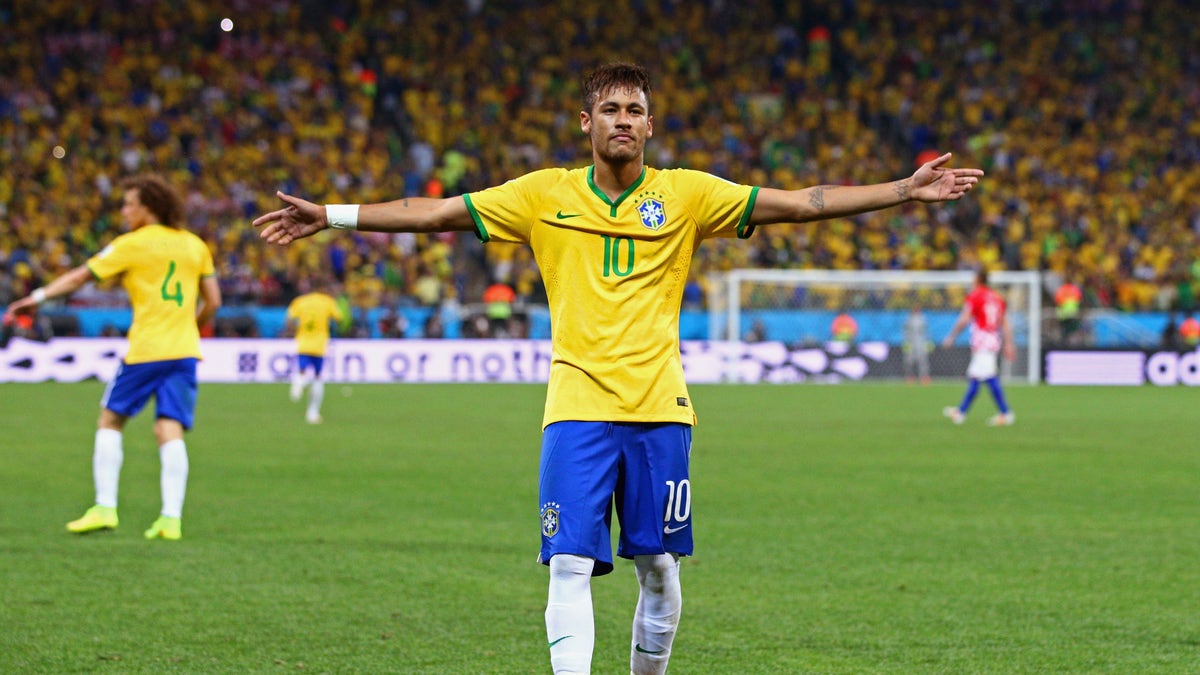
SAO PAULO, BRAZIL - JUNE 12: Neymar of Brazil celebrates after scoring his second goal on a penalty kick in the second half during the 2014 FIFA World Cup Brazil Group A match between Brazil and Croatia at Arena de Sao Paulo on June 12, 2014 in Sao Paulo, Brazil. (Photo by Adam Pretty/Getty Images) (2014 Getty Images)
Brazil’s national fútbol team scored the first goal of the opening game of the 2014 World Cup tournament in São Paulo yesterday. The problem is, Brazilian defender Marcelo Vieira, kicked the ball into his own goal, giving Croatia its only score in a 3-1 loss against the host country.
That episode probably stopped the hearts of 200 million Brazilians, many of whom already were wringing their hands, or shaking their fists, about the astronomical costs and logistical challenges of hosting the world’s biggest sporting event.
[pullquote]
No doubt Brazil is a fútbol powerhouse, and despite the uninspired performance in the opening game it is a contender to win the world championship. What many are wondering is why Brazil has failed to live up to expectations in terms of domestic development, global trade and energy.
For the better part of the last 10 years, the news has been promising. A succession of democratically elected leaders applied sound macroeconomic policies to tame rampant inflation (nearly 3,000 percent in 1990) and made Brazil a stable, top-10 economy. Growing economic opportunity swelled the ranks of middle-class consumers, and income-transfer programs have helped millions lift themselves out of poverty. Brazil’s relative stability in the wake of the global financial crisis of 2007–08 appeared to validate the most optimistic forecasts for the country’s economic future.
The windfall from a commodity boom fueled by Chinese consumption and the discovery of vast deep-water oil deposits in 2007 buoyed the Brazilian economy, lowered unemployment, and filled the government’s coffers. The downside of this rosy scenario is that Brazil’s political leadership has been under no pressure to implement a reform agenda that most experts have been saying for years is needed to sustain growth and unlock its full potential.
In 2012, the tide began to turn. Weakening Chinese demand for commodities and other raw material imports hit the Brazilian economy hard, with growth sliding from 7.5 percent in 2010 to 2.3 percent in 2013. The slowdown also exacerbated contractions caused by the government’s statist economic policies.
Although Brazil’s social welfare programs—such as the Bolsa Familia cash transfers—have helped 50 million people out of poverty, they are not sustainable without robust economic growth. In addition, Brazil spends a staggering 11.3 percent of GDP on public sector pensions. Although Brazil already spends 5.6 percent of its GDP on a public education system that yields very poor results, President Dilma Rousseff pledges to double spending with no meaningful reforms. Ironically, in the midst of a building boom to host sporting events, Brazil’s spends only 1.5 percent of GDP on infrastructure, compared to a world average of 3.8 percent; the resulting inefficiency of roads, railways, ports, etc. drive up the cost of production and undermine exports.
Even with the prospects for vast new oil deposits, Brazil’s petroleum sector has failed to reach its potential because politicians rob the state-run oil company in order to fund social welfare programs. Moreover, statist measures meant to protect the domestic oil industry and its workers has scared away the foreign capital and technology needed to maximize Brazil’s productivity.
Widespread urban demonstrations last June, which many blamed on costly projects associated with the World Cup and Rio de Janeiro’s hosting of the 2016 Summer Olympics, were a sobering reminder that Brazil’s economy is a work in progress. This unrest, which is continuing on the margins of the World Cup activities, may reflect a deeper anxiety among the new middle class that the powerful state that tackled poverty by redistributing wealth may be too inefficient, unresponsive and corrupt to meet their rising expectations.
For many years, economists have urged reforms to improve government efficiency and accountability, tame costly public pensions, simplify the labyrinthine federal and state tax systems, liberalize the labor code, remove arbitrary obstacles to doing business, and incentivize foreign capital and technology into the promising energy sector.
Unfortunately, in reaction to slowing growth and popular discontent—and facing reelection in October—President Rousseff has pledged massive new government spending programs while foregoing the difficult but structural reforms that are essential to restoring and sustaining growth.
The longer politicians refuse to do the heavy lifting of economic reform and fiscal discipline, Brazil’s growth will be stunted. A generation of Brazilian politicians can take credit for helping millions of people pull themselves out of poverty. That legacy is all about solving yesterday’s problems. Leadership is about the future.
Roger F. Noriega was U.S. ambassador to the Organization of American States and assistant secretary of State for Western Hemisphere Affairs in the administration of President George W. Bush from 2001 to 2005 and is a visiting fellow at the American Enterprise Institute. His firm, Vision Americas, represents U.S. and foreign clients.








































